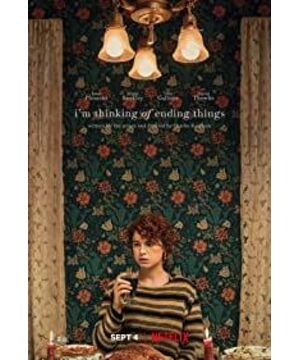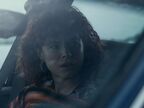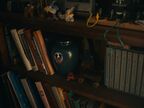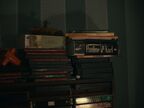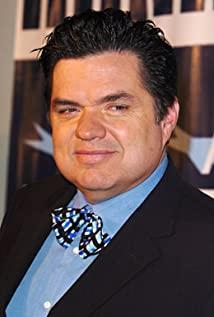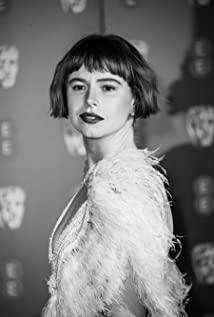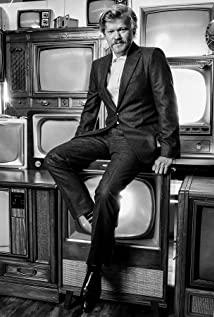The screenwriter and director of "I'm Thinking of Ending Things" (I'm Thinking of Ending Things, 2020) is Charlie Kaufman, who has received multiple Oscar nominations. The film was created by Ian, a young Canadian novelist. An adaptation of Iain Reid’s novel of the same name (the author’s sister is the first lady of Iceland, and her brother-in-law is the current president of Iceland). If you have ever liked "Eternal Sunshine of the Spotless Mind" (Eternal Sunshine of the Spotless Mind, 2004), you should find many scenes with familiar composition and color in the play.
The novel version of "I Want to End All of This" is a thrilling psychological story about an unknown girl, describing her strange journey with her boyfriend Jack, who has been dating for a few months, to her parents' farm in the suburbs. The story of the movie is quite close to the original novel, but the heroine has her own name, Lucy, Lucia, Louisa (Lucy, Lucia, Louisa), and even later called Ames. The original director's idea Lucy was made by Captain Marvel, Brie. Larson (Brie Larson) played, but later it was played by Jesse. Berkeley (Jessie Buckley) as the leading actress, the Irish actress and singer, once performed very well in the 2018 "Wild Rose" (Wild Rose), and won the British Oscar for Best Actress for her acting and singing skills. . This is a story about a single mother who loves to sing, how to get out of a new life from the bottom of the plight, and turn her destiny with singing.
However, Berkeley did not have the opportunity to show her singing voice in "I Want to End All of this", but during the long road journey, she was able to use voice, expression, and body to create a dialogue with her boyfriend and the conflict and tension of inner thoughts. "I want to end it all" is definitely a great test of acting skills for actors. In addition to Bokley, the actor Jesse Plemons (Jesse Plemons), Toni Collette (Toni Collette) who plays the actor's mother, and David Thewlis (David Thewlis) who plays the actor's father, They are all sophisticated acting schools. Through low and plain dialogues and relatively abrupt and absurd laughter, they create the mysterious and gloomy winter night in the farm hut.
"I Want to End All of This" is not a well-understood movie. Kaufman's works, probably except for "Orchid Tribulation" (Adaptation, 2002) and "Ace Enemy", other works such as "New York Ukiyo-e" (Synecdoche, 2008) and "Being John Malkovich" (Being John Malkovich, 1999) are not movies that can be easily understood at once.
However, from the style of Kaufman’s movies in the past, we know that he has a consistent creative idea: the characters are entangled between the conscious and the subconscious, between reality and illusion/fantasy/dream, between the brain and reality, and even Recollection of the soul after death . "I want to end it all" is indeed the same. If you look forward from the end of the story, it might be clearer.
———There are thunders below———
Let's talk about the conclusion directly. Simply put, the main line of the story almost always happened in the brain of an elderly man, his fantasy, expectation, and final action-suicide (that is, "I want to end it all"). At the beginning of the story, when Lucy said she was going to drive with her boyfriend Jack to visit his parents’ home in the country, a man from the house looked outside to see if anyone was coming. This certain man, It is the real actor, that is, the real old Jack who has been the cleaning staff in the high school near Jack's home.
The real Jack, who has always lived in his hometown in the country, did not leave his hometown to go to the city, and met a girl named Lucy. All the plots of Lucy and Jack driving back to the countryside to meet their parents are based on the fantasies of the real Jack (the school cleaner). The real Jack is an old man who is withdrawn and autistic and invisible. He has difficulty making friends and has no friends. He can only watch the drama rehearsal and youth life of high school men and women from a distance.
The real Jack is very eager to be loved by others, and he is eager to have a sincere inner communication with others, but the real Jack is actually a lonely man living with his parents in the farm hut. Not only did he keep getting old, he also watched the aging of his parents, and finally walked into the arms of death. The parents that Lucy saw in Jack's house were old for a while, young for a while, and even dying, they were all plots of old Jack's real life.
Lucy is not a real person, but old Jack's assumptions and fantasies in his mind during his lonely life. In this way, Lucy's name will change from Lucy, Louise, Louisia, to Amis and Yvonne. Because Lucy never really existed, what Lucy said was actually Jack's inner whisper. In this way, we can understand that when Jack asks Lucy if he can tell the new poem he wrote recently, the poem "Bonedog" that Lucy recites will appear in a book in Jack's room (Rotten by Eva HD) Perfect Mouth); this is why, when Lucy looks at the childhood photo on the wall of Jack's room, she will say: "I think this is like my childhood."
Because Lucy does not exist at all, it is just an illusion, so Jack does not want Lucy to enter the basement, because every piece of clothing being washed in the washing machine is the uniform of the cleaner. The horror here does not lie in the dark and gloomy basement, nor is it the mother who always laughs absurdly, but it is possible to expose that Lucy is just Jack's fantasy, and that Lucy is just a pawn in Jack's fantasy.
In other words, when Lucy was at Jack’s house, the reality was that Jack, a middle school cleaner, was an old man living alone. His parents had passed away. The washing machine was washing his uniform. At the same time, he was living in his fantasy and imagination. When he was young, he had a girlfriend who had been dating for six months. He was very smart and cheerful. He was fortunate to take her home to meet her parents and imagine the possible future of the two.
When he imagined Lucy, this girlfriend did not have a clear real appearance. One time he was a painter, another was a medical researcher who was writing a thesis, another was an elderly expert, and another was a savvy scientist. These majors came from Jack. Anticipation and fantasy. When Lucy emphasized that she understands the elderly, the reality reflected in reality is that Jack's health is not good and his life is not very smooth.
At the same time, Lucy's cell phone was always called, but the person who called Lucy was actually herself, and she was in her own circuit at all. When Lucy picked up the phone, they all said the same sentence from the same man: There’s only one problem to be solved, and I feel terrified. I think I’m going crazy and my mind is no longer clear ("There's only one question to resolve . I'm scared. I feel a little crazy. I'm not lucid.”). At this time, not only Lucy has its own circuit, but Lucy and Lucy's phone calls are also fantasies in Jack's mind. In this way, we can also understand why no matter how Lucy begged, she couldn't go back to her home.
Lucy receives Jack's babble, which is Jack from the real world who constantly seeks help and answers from the heart. When Lucy kept talking to herself "I want to end it all", of course it also came from the lingering thought in Jack's mind: end life.
When Lucy couldn't find Jack, she came to the middle school corridor and met old Jack. Lucy once said to old Jack that her boyfriend was wrong, and even stated that the two hadn't really started at all, but only met together thousands of times. Once, asking Lucy to describe Jack, "It's as difficult as asking me to describe a mosquito that stung me on a night 40 years ago." This is Jack's reality, so that women don't like it at all, and even feel that he is a kind of marginal person who harass the society.
The stage where Jack committed suicide was a ballet pas de duo integrated into the high school stage play. This duet dance is taken from the musical "Oklahoma" (Oklahoma!, 1943). The story takes place on a rural farm in Oklahoma. The girl Laurey Williams has two suitors, one is the heroic cowboy Curly McLain, and the other is a farm worker plus Jud Fry. This double dance is Lori struggling with the mood of two suitors. In the end, Lori fires the farm worker and accepts the feelings of the cowboy. However, after being dismissed and frustrated in love, the farm worker was filled with grudges, so one day he returned to the farm with a bayonet, and the cowboy would be stabbed in the chest. The final ending of the pas de deux, the young dancer fell to the ground and spurted blood. Dying in the snow on the high school basketball court.
The pas de deux quoting "Oklahoma" is the old Jack in reality, cutting off the young Jack in fantasy, bringing himself back to reality, and ending his life at the same time. This is a very sad story. A marginalized person who has lived his entire life in inferiority complex, loneliness and darkness, living only a trace of romantic fantasies, but ultimately losing to the cold winter and the threat of health, not to the pessimistic helplessness of life, Instead, he would take his own life and truly "end it all".
Kaufman quoted many literary works in the film's dialogues and images. Some quotes were taken from the original novel, and some were added by Kaufman's ingenuity. Whether it is a director or a novelist, Kaufman and Reid are both very knowledgeable contemporary creators. There are many classic works and crystallization of wisdom hidden between the lines. This is why watching Kaufman’s movies is very different. The experience is a real brain-burning and brainwave shock.
View more about I'm Thinking of Ending Things reviews


